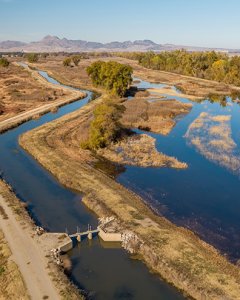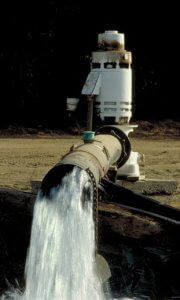By Roger Cornwell, NCWA Chair of the Board of Directors; and Jim Mayer, NCWA First Vice-Chair of the Board of Directors
Northern California Water Association’s (NCWA’s) five-year strategic priorities are now finalized and approved by the NCWA Board of Directors, and it was a privilege to be part of the process. These priorities are more than a roadmap—they’re a catalyst, driving momentum, adapting to change, and sustaining long-term progress. These priorities reflect a commitment to water stewardship that is as dynamic as the productive working landscapes and the natural systems we seek to protect.
Vitalizing Healthy Rivers, Landscapes, and Communities
NCWA is dedicated to fostering a resilient Sacramento Valley where water resources support economically vibrant communities, thriving farmlands, abundant wildlife habitats, and healthy rivers and landscapes.
Working closely with scientists, conservationists, community leaders, and policymakers, NCWA promotes collective stewardship and multi-benefit water management to meet present and future water needs and adapt to a changing climate.
The Sacramento Valley is a critical piece of California’s water management puzzle. Since much of California’s water supply originates in and flows through the Sacramento River Basin, effective stewardship actions and management practices in our region deliver important benefits for the entire state.
Our Policy Priorities
 1. Help ensure the human right to clean water for local communities.
1. Help ensure the human right to clean water for local communities.
Sacramento River Basin leaders are committed to expanding and ensuring access to clean, safe, and affordable drinking water for all communities in our region.
NCWA convenes the North State Drinking Water Solutions Network as a forum to address the various technical, managerial, and financial challenges facing local drinking water systems. The Network assists communities identified in the State Water Board Needs Assessment and is helping to implement a Nitrate Control Program in Yolo County.
In addition, NCWA convenes the Sacramento Valley Water Quality Coalition, which coordinates water quality monitoring and protection programs with state regulators and other key stakeholders including the California Rice Commission, Agricultural Commissioners, Farm Bureaus, Resource Conservation Districts, Groundwater Sustainability Agencies, and commodity organizations.
2. Implement holistic, nature-based solutions that restore ecological functions and support multi-benefit water management.
The Sacramento River Basin provides water for three million Californians, two million acres of productive farms and ranches, and critical wildlife habitats. Ensuring that our limited and variable water supply serves all of these interests simultaneously requires modern, holistic water management from ridgetop to river mouth.
HEALTHY FORESTS AND HEADWATERS
 The Sacramento River Basin includes the headwaters for most of California’s water supplies, and responsible and active forest management is a foundational component of efforts to promote healthy headwaters. Programs implemented by our region’s water managers and their partners provide innovative, collaborative, and scalable models for improving the health of our headwaters and reducing wildfire risk. Examples include Placer County Water Agency’s French Meadows Forest Restoration Program in the American River watershed and the Yuba Water Agency’s pioneering efforts in forest protection and watershed restoration.
The Sacramento River Basin includes the headwaters for most of California’s water supplies, and responsible and active forest management is a foundational component of efforts to promote healthy headwaters. Programs implemented by our region’s water managers and their partners provide innovative, collaborative, and scalable models for improving the health of our headwaters and reducing wildfire risk. Examples include Placer County Water Agency’s French Meadows Forest Restoration Program in the American River watershed and the Yuba Water Agency’s pioneering efforts in forest protection and watershed restoration.
REENERGIZING RIVERS AND CREEKS FOR SALMON RECOVERY
The Sacramento Valley Salmon Recovery Program outlines NCWA’s comprehensive approach to improving conditions for every freshwater life-stage of salmon migrating up and down our region’s river systems. Developed in collaboration with state and federal regulators and leading conservationists, the Program aligns flows with function to ensure a sufficient volume of water is available at the right time and place to support robust, resilient populations of salmon.

Taking a holistic approach that accounts for all salmon life stages and freshwater habitats – instead of focusing solely on Sacramento River temperature management – provides the best opportunity for salmon recovery in the Sacramento River Basin. Ongoing work includes further unconfining the Sacramento River system, reactivating floodplain habitats, improving access and habitats on Butte Creek and Battle Creek, improving hatcheries, and pursuing reintroduction opportunities above Shasta Dam.
These actions are all designed to restore the ecosystem functions of the landscapes and riverscapes, while concurrently helping secure water supplies for communities, farms, other fish and wildlife, recreation, and hydropower.
REACTIVATING FLOODPLAINS FOR MULTIPLE BENEFITS
 NCWA strongly supports the Floodplain Forward Coalition, an innovative collaboration between 30 organizations based in conservation, biology, water management, farming, and local government that is advancing a ‘landscape scale’ vision to build resiliency in our region’s ecosystems and water systems.
NCWA strongly supports the Floodplain Forward Coalition, an innovative collaboration between 30 organizations based in conservation, biology, water management, farming, and local government that is advancing a ‘landscape scale’ vision to build resiliency in our region’s ecosystems and water systems.
The Coalition’s dynamic conservation strategies will help sustain the abundant return of migratory birds along the Pacific Flyway, revitalize river food webs to support the recovery of salmon and other fish populations, recharge groundwater aquifers, and improve flood protection in an era of increasing storm severity and climate variability. The scientific monitoring that will accompany these projects will also inform future fish and wildlife recovery efforts.
3. Prepare for and adapt to extreme weather and climate change, which requires saving excess water wherever possible.
 In response to unprecedented dry conditions statewide, the state administration released California’s Water Supply Strategy in August 2022, which calls for the modernization of our water management system as the state adapts to our new climate reality.
In response to unprecedented dry conditions statewide, the state administration released California’s Water Supply Strategy in August 2022, which calls for the modernization of our water management system as the state adapts to our new climate reality.
GROUNDWATER SUSTAINABILITY
Working in coordination with state government and local Groundwater Sustainability Agencies, the NCWA Groundwater Management Task Force has developed a Pathway for the Future: Sustainable Groundwater Management in the Sacramento Valley, a roadmap for building the institutional capacity necessary for effective regional groundwater management. Active groundwater management is critical for our region’s future, and the Groundwater Task Force has helped identify nature-based solutions to support aquifer health in the Sacramento River Basin.
SITES RESERVOIR
As Sacramento River Basin water managers look to serve multiple benefits far into the future, the importance and need for Sites Reservoir is clear. Sites Reservoir is an innovative 21st century water project: an off-stream regulating reservoir on the west-side of the Sacramento Valley that can capture and store water during high runoff periods for various beneficial uses at a later time. Sites Reservoir would dramatically enhance California’s water management system, providing flexibility to address uncertainties created by a changing climate and improving environmental and water supply resilience.

Please see the full NCWA 5 Year Strategic Priorities.
The NCWA Board of Directors always appreciates hearing additional thoughts, ideas or questions for the Sacramento Valley. Please share them at info@norcalwater.org.





